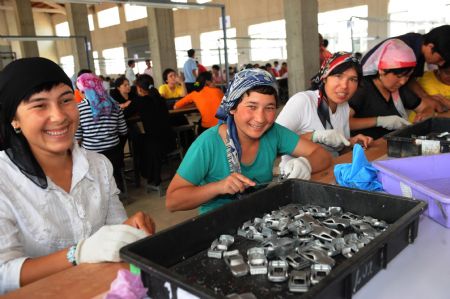After the clash, Turdi said that they helped all the Uygur workers to make phone calls to their families.
"Unlike reports from some media, most of the workers from Xinjiang are now willing to continue working here," he said.
A 24-hour clinic was set up in the factory with instructions in the Uygur language. A doctor said that all the medicines were free of charge.
Denouncing the lie
In the early hours of Sunday, the Urumqi police department got a tip-off that there were calls on Internet forums for demonstrations.
The riot began around 8 p.m., when rioters started beating pedestrians and smashing buses. The violence soon spread to many other downtown areas.
 |
|
Xinjiang employees work at Xuri toy factory in Shaoguan City, south China's Guangdong Province, July 7, 2009. More than 700 Xinjiang workers went back to work here on Tuesday after renovation of workshop, dormitory and dining-room. Their work had to be suspended after the fight between Uygur and Han ethnic workers at the toy factory on June 26. [Xinhua]
|
Police said at least 156 people had died and more than 800 were injured in the riot.
Many workers in the Xuri Toy Factory were dissatisfied seeing some media citing the clash in the factory as the cause of the Urumqi riot on Sunday.
"We are so faraway from Xinjiang and I don't know why they make our factory the scapegoat," said Jin Ling, the worker from Jiangxi.
Her colleague Luo Shan also believed that the accusation was "unreasonable".
"The problem in our factory was that we couldn't understand each other's language," she said. "It lies with communication."
Despite the dispute, Luo said she would try to keep a good relationship with Uygur workers.
"We shared the same goal -- everybody is coming to earn a living," she said.
"I'd like to work with my colleagues, Hans and Uygurs alike."
(Xinhua News Agency July 8, 2009)